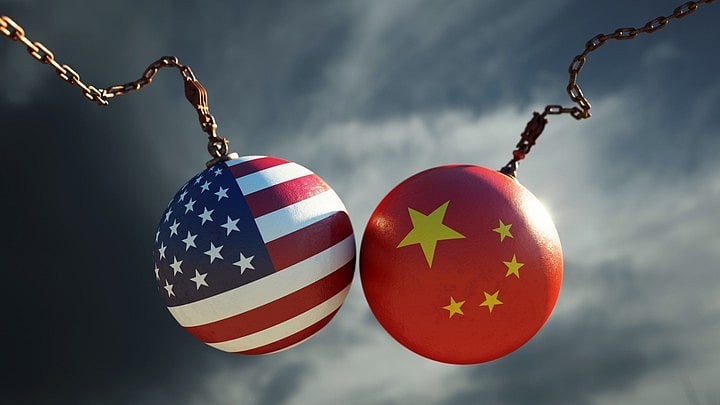
Representative image indicating US-China tariff war.
Credit: iStock Photo
President Donald Trump's global trade war intensified Wednesday as China announced additional levies on American goods, hitting back at the United States hours after Trump's punishing new tariffs took effect. Stocks and bonds slumped again on the moves, which heightened fears of a global recession as the European Union prepared its own retaliation for US steel and aluminum tariffs.
Trump's latest tariffs hit nearly all US trading partners with new levies and raised import taxes on Chinese goods to 104 per cent. Beijing then announced additional tariffs on imports from the United States, for a total levy of 84 per cent, to go into effect within hours.
Losses have mounted in stock markets around the world since Trump announced this latest round of tariffs last week, and bond yields rose as the tumult has started spreading to the government debt market, traditionally seen as a safe haven in times of uncertainty. Yields rise when investors sell bonds, which can reflect worries about inflation, shifts away from US dollar assets or a need for investors to raise cash to cover losses on other trades.
Rising yields push up the cost of borrowing for mortgages, credit cards, business loans and many other rates, an unwelcome development for the Trump administration, which has made reducing rates a priority, since cheaper debt supports economic growth.
The market rout reflects deepening concern that Trump's tariffs could disrupt global supply chains, fuel inflation and set off a severe economic downturn.
Many world leaders have rushed to negotiate with the Trump administration, scheduling phone calls and sending delegations to Washington. Governments including Taiwan and Vietnam have offered concessions in hopes of avoiding the tariffs. Trump said that 70 countries had approached the United States, and that officials would begin talks with Japan and South Korea.
Here's what else to know:
-- Markets fall: Asian markets slumped again Wednesday, and stocks in Europe also fell in early trading. France's CAC 40 index plunged, wiping out its gains since the beginning of the year. The S&P 500, the benchmark U.S. stock index, is close to tumbling into a bear market, a worrisome threshold for investors.
-- Asian industry: In commercial and industrial hubs across Asia, businesses grappled with the effects of the levies. Along a strip of small garment and machinery shops in Guangzhou, China, the mood among factory owners was tense. One said he was confident that Americans would still want his exports, but added that he was worried about a drop in consumer confidence and spending in the United States.
-- Indian pharmaceuticals: Trump spooked India's pharmaceutical industry, the country's most successful exporters, when he said Tuesday that he would soon announce "a major tariff" on drugmakers. The companies had been exempted in the first round of levies, but Trump has argued that in the long term more medications should be made in the United States.
-- Rate cuts: At least two central banks cut borrowing costs Tuesday, citing the levies and growing pessimism about the global economy. India and New Zealand made the moves at meetings that had been scheduled before the tariffs took effect.